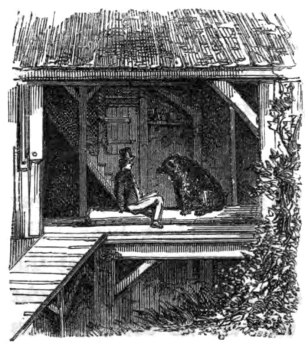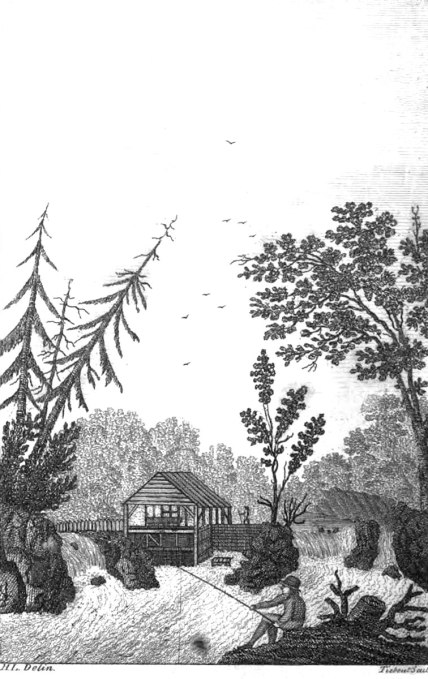The Bear in the Saw-Mill –

You never should attack a foe
Until his arms and strength you know:
And this we’ll clearly shew in
The tale that we shall here relate,
Of the catastrophe and fate
Of Mistress Bridgit Bruin.
One day, a saw-mill she came near,
Just at the time the sawyer’s cheer
Was brought him for his dinner;
It smells right sweetly, quoth the beast,
I’m hungry, and I’ll have a feast,
As sure as I’m a sinner.
Sawyer, do you be off, said she.
And leave your saw-mill here to me,
To learn the art of sawing;
And do you lay that dinner down
Upon the log there, or, you clown,
Your carcase I’ll be pawing.
The sawyer thought it wise to shun
Disputes with bears, so off he run,
And left his meal behind, sir;
He griev’d to leave a dish so good,
But left it on the log of wood,
To Mistress Bruin’s mind, sir.
Upon the log she quickly leap’d
And busily her teeth were kept
Upon the eggs and bacon;
This is, quoth she, right dainty fare,
And worthy of a lady Bear,
Or I am much mistaken.
While thus engaged with tooth and nail,
She to the saw had turn’d her tail,
Intent alone on feeding;
The saw, mean time, determin’d sure,
That if his teeth should get into ‘er,
They’d teach her better breeding.
And as he kept advancing slow,
He reaeh’d her tail, and nick’d so
As just to make it bleed, sir,
She turn’d and growl’d, you saucy dog!
Before that I have left this log
I’ll mark you for that deed, sir.
But being hungry, to her food
Again she turn’d with stomach good;
To fight not yet inclin’d, sir;
The saw, advancing ev’ry stroke,
At length on her posterior broke,
And dock’d her close behind, sir.
Dunder and blixum! roar’d the bear,
(In Shonggum* she had learn’d to swear,)
I’ll give you caterwauling;
Then furious turn’d on Mister Saw,
Who firm withstood her gripe and jaw,
And with his teeth tore out her maw,
And quickly laid her sprawling.
* So pronounced. Shawangunk was originally a Low Dutch settlement. The fable is founded on a fact that is said to have happened during the early settlement of that town. —The bear, with her cubs, were chased out of the settlement and coming to a saw-mill near the bank of the Hudson, she came to a tragical end, in the manner above described. The story is related at full length, in a number of the New-York Magazine, published in 1794 [sic].
The Plough Boy – August 26, 1820
Above illustration from:
Marco Paul’s Voyages & Travels, Maine by Jacob Abbott, 1852

Of the Saw-Mill of Henry Livingston, jun. near Poughkeepſie.
[with an engraving]
The natural beauties of the caſcade on which this ſaw-mill ſtands, are not equalled perhaps by any in America.—A curious anecdote relating to this mill is worth mentioning:—
A female bear and two cubs were purſued by hunters from the weſt ſide of Hudſon’s river, and took ſhelter in the wood that ſurrounds this mill. Early next morning, one Buyce, the miller, diſcovered an enormous bear and two ſmaller ones aſcend the mill, (the mill was then going;) on the log, which was continually moving to the ſaw, was placed the ſawyer’s breakfaſt.
The hungry bear, urged by the delicious effluvia of the bread and cheeſe, ſeized it as her lawful prize, and jumped on the moving log, with her tail towards the ſaw; the cubs placed themſelves on the log directly before her.
She had ſcarce began her repaſt, when the titulatiun of the ſaw moving perpendicularly with amazing force, touched her tail; with contempt ſhe ſnarled, grinned, and looked behind her, when, in a moment, the ſalutation of the ſaw amputated her tail. She then with fury turned towards the ſaw, and with a hideous yell, raiſed herſelf on her hind legs, graſped the ſaw, and in four ſeconds was torn to pieces.
The ſawyer then approached, killed one of the cubs with a crow bar; the other fell down the mill, and, ſtunned by the fall, was taken alive, and is now in the poſſeſſion of the miller, the dread of all the dogs in the village.
The New-York Magazine; or, Literary Repository – August, 1792
—Jeff Burks





